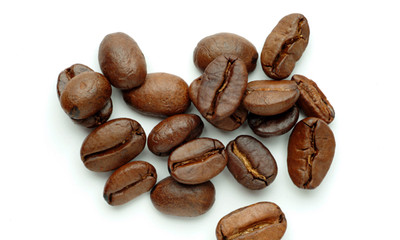Why "Good" Coffee Is Healthy
Jeremy Denny on 21st Jul 2020
A brief guide to understanding the complex relation between health & coffee.
Polyphenols are plant-based compound made up of flavonoids, tannins and phenolic acids. Forming the largest group of phytochemicals and are found in a variety of foods, especially coffee. They play a role in health through antioxidant and anti-inflammatory effects. We are just now learning how important and impactful these compounds are.
In many modern cultures the main source of polyphenols come from coffee. Followed by tea, chocolate, fruit, vegetables and beer. If you are going to use coffee as a staple food source for daily intake, you should use a good source of beans. Clean & intelligently farmed, processed and shipped green beans. Then are stored, roasted and cared for in a way to lower bacteria, mycotoxins and carcinogenic compounds. The less “burnt”, more developed and cleaner processed beans will be a better choice for health reasons.
Depending on the region, weather and roasting processes the coffee bean will have a vastly different variety of polyphenols. Lighter roasted coffee will have less chemical compound degradation, there for maintaining more of its polyphenols as well as such things as higher caffeine levels. An astonishing fact is polyphenols from coffee have high bioavailability, roughly 30% absorption efficacy.
Potential antioxidant and anti-inflammatory results of polyphenols studied so far:
- Slows or stops developing type 2 diabetes
- Curbs and lowers cases of metabolic syndrome
- Mitigates certain types of cancer
- Increases resistance to Cardiovascular Disease (CVD)
- Reduces risk of high blood pressure
- Reduced risk of hyper-homocysteinaemia, a risk in CVD.
Additionally, higher polyphenol intake has been associated with lower BMI, blood pressure and triglycerides. When you eat, your body converts any calories it doesn't need to use right away into triglycerides. They are later releases via hormones.
Chlorogenic acids, members of the group of hydroxycinnamic acids which are esters of quinic and cinnamic acids. Chlorogenic acids are the main types of polyphenols found in coffee making up about 7-9% by weight. Chlorogenic acids are degraded by heat. Chlorogenic acids are a special interest due to their wide spectrum of potential health benefits such as antioxidative, anti-diabetic, anti-carcinogenic, anti-inflammatory and anti-bacterial effects. In animals chlorogenic acids reduces the incidence of liver and colorectal cancer.
Caffeic and ferulic acids polyphenols function to help reduce cholesterol levels. Caffeic and ferulic acids aid the transport of macrophage foam cells to the liver, where it is processed for excretion.Trigonelline, a nicotinic acid has be shown to lower blood sugar in animals, Reduces risk of type 2 diabetes. A host of these compounds may protect against cirrhosis, heavy coffee drinkers have up to an 80% lower risk.
The two major terpenes in coffee are cafestol and kahweol, both are natural diterpenes. Cafestol and kahweol have shown to have multiple pharmacological actions such as anti-inflammation, hepatoprotective and anti-cancer. Most significant mechanism is involved in down-regulating inflammation mediators by increasing glutathione. Including apoptosis of tumor cells and anti-angiogenesis.
Coffee has about 100mg of caffeine in a 8oz cup. Most people can easily consume 300mg of caffeine daily without any issues. Caffeine breaks down body fat, making free fatty acids available as fuel. Several studies show that caffeine boost metabolic rates between 3-11% and can increase physical performance by up to 12% on average.
Black coffee contains more than 95% water by ratio depending on brewing method. According to research, when consumed in moderation, will not cause any dehydration. Therefore, a cup of black coffee will contribute to your bodies daily fluid balance. This low calorie, fat-free, sugar-free drink does contain trace amounts of protein.
The term “Nutrients” are comprised of two main categories, macronutrients (carbohydrate, fat and protein) and micronutrients (vitamins and minerals). Black coffee contains no significant amounts of the macronutrients, thus contains only very few calories. Black coffee contains a number of micronutrients, notably potassium, magnesium, niacin and low sodium. Obviously putting additives in your coffee will significantly change the nutrient density.
A cup of coffee contains:
- Riboflavin (vitamin B2): 11% of the Reference Daily Intake (RDI).
- Pantothenic acid (vitamin B5): 6% of the RDI.
- Manganese and potassium: 3% of the RDI.
- Magnesium and niacin (vitamin B3): 2% of the RDI.
The British Medical Journal after comprehensive study found these percentages:
- Reduced the risk of death from cardiovascular disease by 19%
- Lowered the risk of death from coronary artery disease (CAD) by 16%
- Reduced the risk of death from stroke by 30%
- Lowered the risk of non-alcoholic fatty liver disease (NAFLD) by 28%
- Reduced the risk of liver cirrhosis by 39%
- Lowered the risk of metabolic syndrome by 9%
- Lowered the overall incidence of cancer by 18% (most specifically prostate cancer, endometrial cancer, melanoma, oral cancer, leukemia, non-melanoma skin cancer, and liver cancer)
Anecdotal research says, consuming coffee regularly is associated with a decreased risk of depression and cognitive disorders such as Alzheimer disease. Studies show that coffee drinkers have a much lower risk of Parkinson's disease, with a risk reduction ranging from 32–60%. Another study of 208,424 individuals coffee drinkers whom enjoyed 4 plus cups daily were 53% less likely to die by suicide.
While the health benefits outweigh the negatives dramatically when it comes to coffee, here are some potential negative affects you should be aware of:
- Insomnia
- Nervousness and anxiety
- Headaches
- Stomach upset
- Nausea and vomiting
- Ringing in the ears
- Irregular heartbeat
- Diarrhea
Roasted coffee converts and creates over 1,000 bioactive chemical compounds. Some people can have increased blood pressure, anxiety, insomnia & osteoporosis with higher than 300mg caffeine consumption daily. Coffee is well known for giving energy, increased cognition and more, but varies with each consumer. Also, as a reminder, the intake of each compound relies on coffee origin, species, roasting temperature, brewing method and serving sizes.

